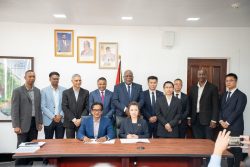HAVANA, (Reuters) – The arrival of a Chinese-built drilling rig set to explore for oil in Cuban waters has been delayed again and is not expected to reach the island until the second half of December, sources close to the project said.
The delay is the latest of many as communist-run Cuba awaits the start of a project it hopes will give a shot in the arm to its struggling economic system.
The massive Scarabeo 9, which set sail from Singapore in late August, had been expected in Cuba by early November, but was slowed by problems not unusual for a newly built rig going to its first drilling operations, people close to the project said this week.
The late December arrival means the first well, to be sunk in 5,600 feet (1,700 metres) of water off Cuba’s northern coast, may not be started until January, the sources said.
They warned that further delays were possible as the rig makes its journey halfway around the world after it was built in Yantai, China, and completed in Singapore. It was said to be currently off the coast of West Africa, although reports about its location varied.
Cuba had hoped to begin exploring for oil in its part of the Gulf of Mexico several years ago, but the project has been put off by construction delays and other issues.
The high-tech rig belongs to Saipem, the offshore unit for Italy’s Eni SpA, and has been contracted by Spain’s Repsol YPF for the Cuba project, which is the island’s first major exploration offshore.
It will be used to drill at least three wells, two by Repsol in a consortium with Norway’s Statoil and a unit of India’s ONGC, and another by Malaysia’s Petronas in partnership with Russia’s Gazprom Neft.
After that, plans for the project, which has been cloaked in secrecy, are not clear, but may depend on the success of the first three wells, a diplomatic source said.









